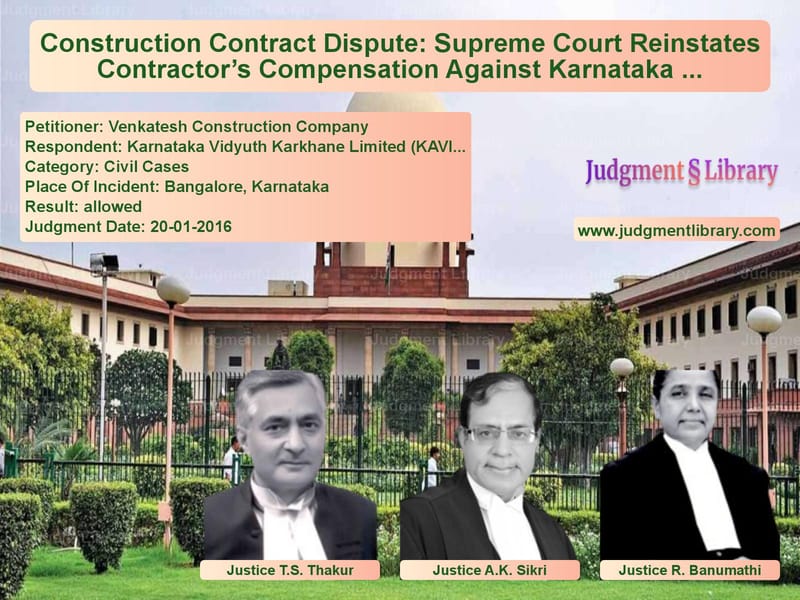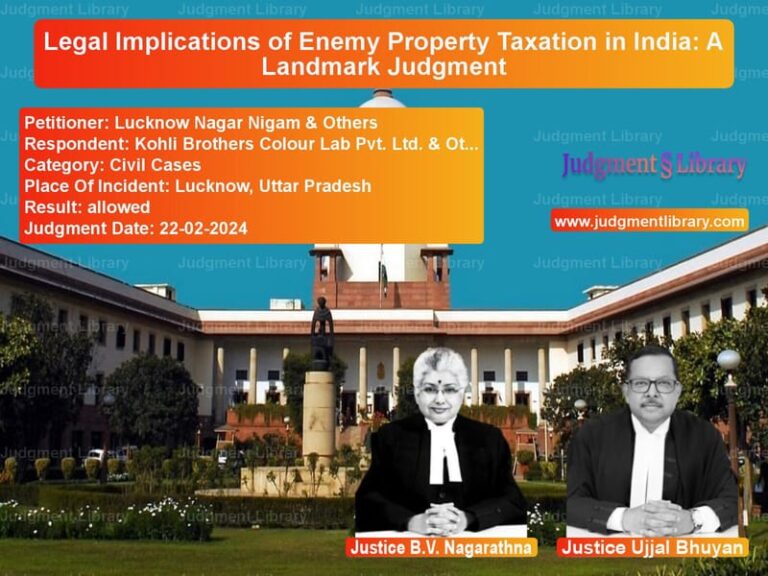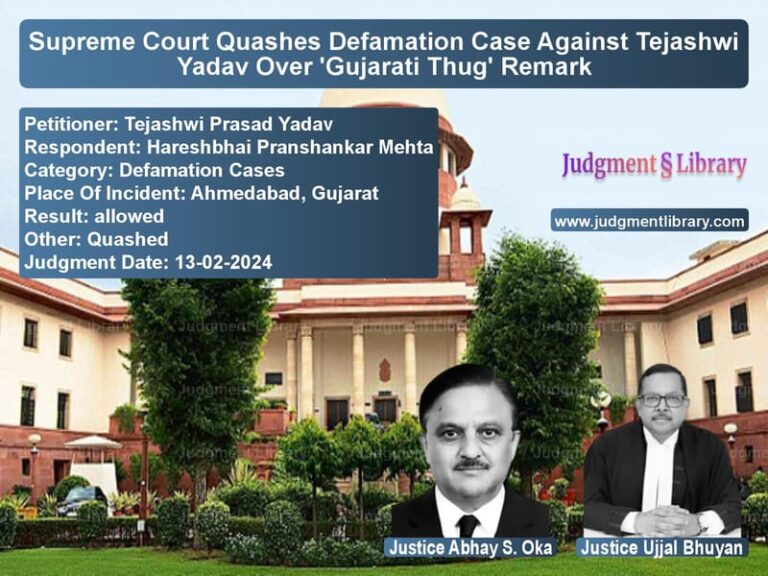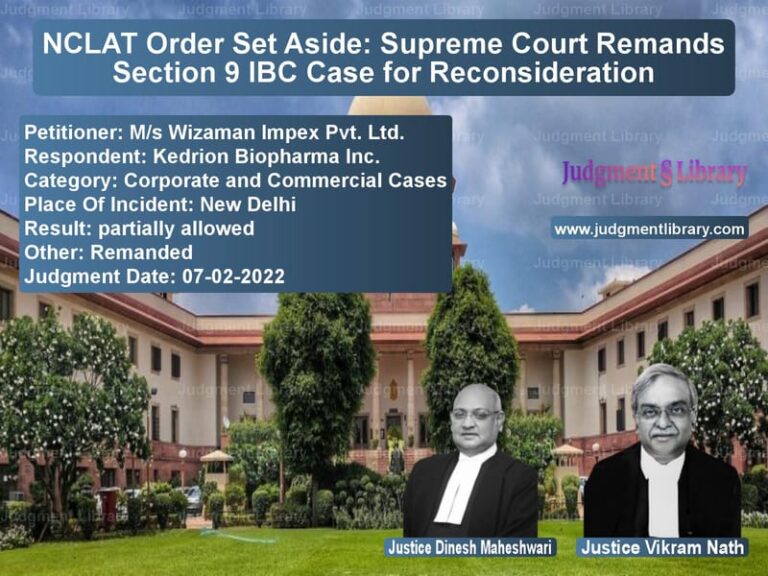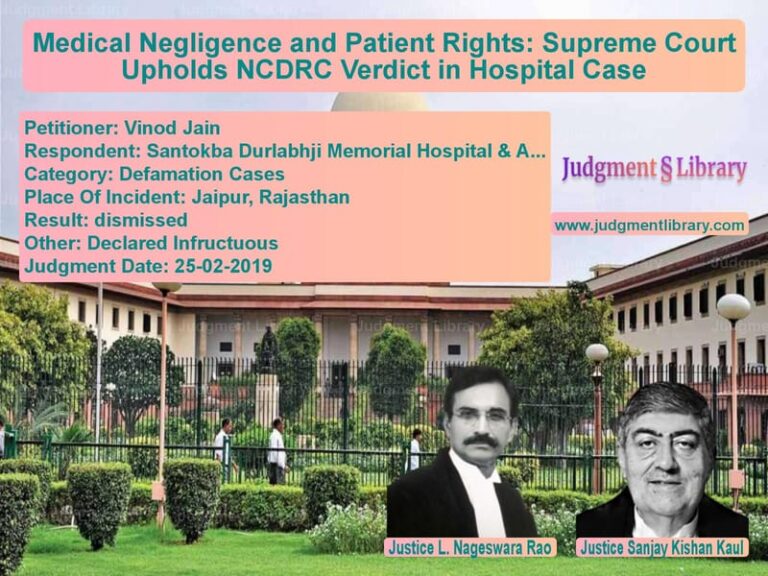Construction Contract Dispute: Supreme Court Reinstates Contractor’s Compensation Against Karnataka Vidyuth Karkhane Limited
On January 20, 2016, the Supreme Court of India delivered a significant judgment in Civil Appeal Nos. 461-462 of 2016, deciding in favor of Venkatesh Construction Company in a contractual dispute against Karnataka Vidyuth Karkhane Limited (KAVIKA). This case highlights critical aspects of construction contracts, unforeseen site conditions, and the obligations of government entities in handling contractual claims.
Background of the Dispute
Venkatesh Construction Company, a well-established contractor in civil works, secured a government contract from KAVIKA on February 12, 1992. The project included the construction of:
- A compound wall along KAVIKA’s boundary.
- An underground sump.
- A storage shed for core assembly.
The estimated project cost was ₹10,86,200. The contractor based its bid on the assumption that excavation would involve soil removal up to a depth of 1.5 meters with an average trench width of 4.25 meters. However, once the excavation began, unexpected water seepage from the Vrushabhavathi river caused severe complications.
Change in Site Conditions and Work Modifications
When excavation started, the soil was unstable, and seepage from the river made it impossible to proceed as planned. The respondent’s engineers instructed the contractor to:
- Dig deeper (up to 4 meters) to reach a stable foundation.
- Expand the trench width (up to 6 meters at the top) to maintain stability.
- Reinforce the embankment to prevent soil collapse.
Due to these additional requirements, the contractor incurred unforeseen costs, leading to an increased project budget. However, after making an initial payment of ₹4,50,000 in running bills, KAVIKA abruptly halted the work and failed to provide revised design specifications.
Contractor’s Legal Action
Following multiple unanswered letters seeking permission to resume work, the contractor issued a legal notice on March 15, 1993. With no response from KAVIKA, Venkatesh Construction Company filed a civil suit (O.S. No. 11037 of 1993) in the Additional City Civil Judge’s Court, Bangalore, seeking:
- Payment for completed work.
- Compensation for additional excavation.
- Reimbursement for stocked materials.
- Liquidated damages due to work stoppage.
The total claim amounted to ₹30 lakhs.
KAVIKA’s Defense
KAVIKA admitted that a contract was signed but disputed the contractor’s claims, arguing that:
- The work was executed within the originally agreed scope.
- The contractor stopped work unilaterally, not due to instructions from KAVIKA.
- No additional work beyond the contract terms was performed.
- Payments had already been made for legitimate work.
Trial Court’s Findings
The trial court framed seven issues and, after evaluating testimonies and documents, ruled in favor of Venkatesh Construction Company. Key observations included:
- The additional excavation and embankment reinforcement were necessitated by site conditions.
- KAVIKA engineers approved these modifications.
- KAVIKA failed to provide revised designs, effectively stalling the project.
The trial court ordered KAVIKA to pay:
- ₹1,45,525 for unpaid completed work.
- ₹1,00,000 for loss of stocked materials.
- ₹3,23,000 as total compensation with 12% interest per annum.
High Court Reversal
KAVIKA challenged the decision in the Karnataka High Court, which overturned the trial court’s ruling on June 15, 2010. The High Court reasoned that:
- The contract’s Clause 11 required prior written consent for additional work.
- The contractor did not follow contractual procedures for extra work approval.
- The trial court improperly acted like an arbitration body.
This reversal dismissed the contractor’s compensation claim, leading to an appeal in the Supreme Court.
Arguments in the Supreme Court
Venkatesh Construction Company argued:
- The additional excavation and reinforcements were a necessity, not an option.
- KAVIKA’s own engineers verified the extra work.
- The company incurred substantial financial losses due to work stoppage.
KAVIKA countered:
- The contractor should have assessed site conditions before bidding.
- Any additional work needed prior written approval.
- The claim amount was exaggerated.
Supreme Court’s Verdict
The Supreme Court reinstated the contractor’s claim, ruling that:
“The High Court was not right in placing reliance upon Clause 11 of the contract to reverse the findings of the trial court.”
Key findings included:
- The site conditions significantly altered project requirements.
- KAVIKA’s failure to issue revised designs paralyzed the project.
- Documentary evidence confirmed additional work.
The Supreme Court restored the trial court’s award of ₹3,23,000 but reduced the interest rate from 12% to 6% per annum.
Key Takeaways from the Judgment
- Public contracts must accommodate unforeseen site conditions.
- Government agencies must respond promptly to contractor concerns.
- High courts should not overturn factual findings without clear errors.
Conclusion
This ruling reinforces fair treatment of contractors in government contracts and emphasizes the responsibility of public bodies to handle contractual modifications responsibly. It sets a precedent for resolving construction disputes fairly and ensures that contractors are not unfairly penalized for adapting to changing site conditions.
Don’t miss out on the full details! Download the complete judgment in PDF format below and gain valuable insights instantly!
Download Judgment: Venkatesh Constructi vs Karnataka Vidyuth Ka Supreme Court of India Judgment Dated 20-01-2016.pdf
Direct Downlaod Judgment: Direct downlaod this Judgment
See all petitions in Contract Disputes
See all petitions in Judgment by T.S. Thakur
See all petitions in Judgment by A.K. Sikri
See all petitions in Judgment by R. Banumathi
See all petitions in allowed
See all petitions in supreme court of India judgments January 2016
See all petitions in 2016 judgments
See all posts in Civil Cases Category
See all allowed petitions in Civil Cases Category
See all Dismissed petitions in Civil Cases Category
See all partially allowed petitions in Civil Cases Category

